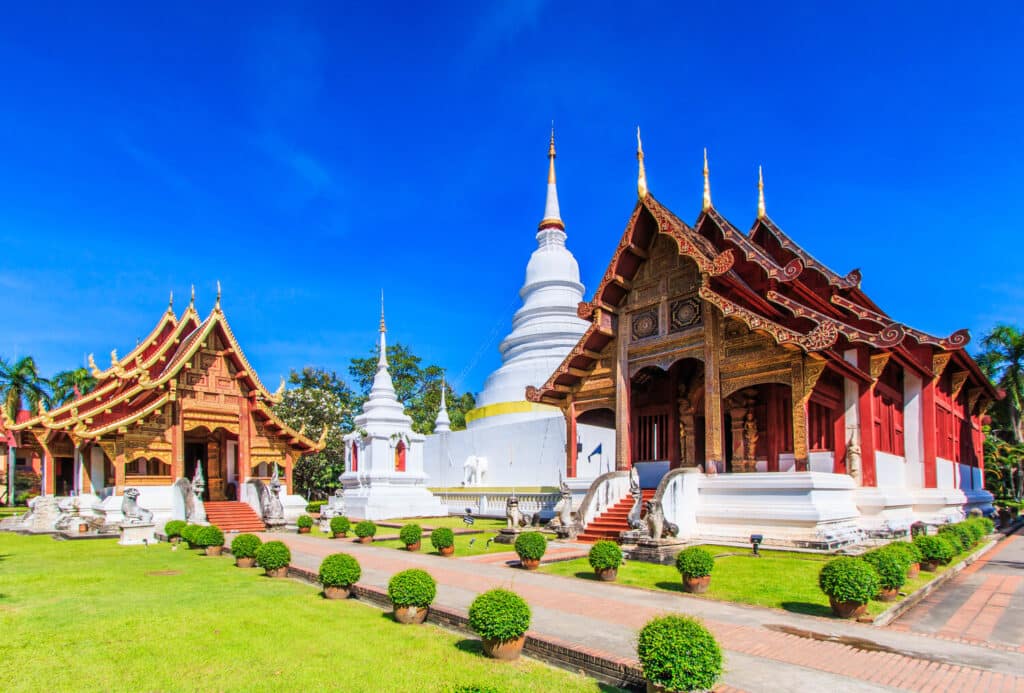
Chiang Mai, Thailand
A Digital Nomad Guide to Chiang Mai
Asia always wins the hearts of travelers with its unique identity, the beauty of the traditional life flow which the Western World has forgotten behind the curtains of the modern century. Usually, people say if you are looking for materialism you travel west if you are looking for spirituality your way lies to the east.
Thailand is one of these special places where spirituality is found, where the mind leaves the stage and lets the heart work and experience. Not a secret that in Thailand you find lots of Buddhist monasteries, hundreds of temples, and thousands of monks.
Let’s imagine that if Bangkok is the capital of The Kingdom of Thailand then Chiang Mai is the soul of the country or, maybe, of all Southeastern Asia. Chiang Mai is situated in northern Thailand, 700 kilometers away from Bangkok, and surrounded by a mountainous area, it is just 310 meters above sea level. Chiang Mai is the second-largest city in the country, it’s also the capital of the eponymous province.
Over the last few decades, Chiang Mai has turned from a quiet religious town with hundreds of Wats (Buddhist temples) into a vibing, sometimes overcrowded city, full of tourists coming from everywhere around the world. The richness of culture and the neighboring nature of the city attract millions of tourists each year. The loyal system of immigration makes it easy for almost any desirer to stay in the country for a crazy long period of time just on temporary visas.
Chiang Mai has developed a great infrastructure and amenities for the needs of those who travel here and decide to stay, especially as a working online expat. The city is full of digital nomads and as known the demand creates the supply, so many cafes, coworking spaces, hotels, and hostels opened to please the city’s guests.
Living in Chiang Mai Overview
| $1.44 | |
| $2.01 | |
| $1.65 | |
| $1.24 | |
| $0.46 | |
| $0.86 | |
| $57.50 | |
| $19.08 | |
| $35.88 | |
| $341.33 |
| Child Friendly | |
| Cultural Tolerance | |
| LGBTQ Friendly | |
| Traffic Safety | |
| Nightlife | |
| Large DN Community | |
| Young Community | |
| Proper Hygiene | |
| Clean |
| Emergency Numbers | Police | 911 or 191 |
| Ambulance | 1669 | |
| Fire-fighters | 199 | |
| Money Handling | Currency | Thai Baht (฿) |
| Max ATM withdrawal | ฿20,000 | |
| Tipping | Yes | |
| Communication | Languages | Thai |
| Calling code | +66 | |
| Time zone | UTC+07:00 | |
| Health | Tap Water | Non Drinkable |
| Vaccinations | None |
foodpanda – food and more, delivered
Craving something delicious from your favourite restaurant? Forgot to pick up the shopping on your way home? We deliver food and groceries in a flash – whatever you’re after. It’s our mission to bring everything you want, need or crave right to your door, whether it’s a meal from your favourite local restaurant or same day grocery delivery and cleaning supplies.
Grab is Southeast Asia’s leading superapp. We offer essential everyday services to over 670 million people across Singapore, Indonesia, Malaysia, Thailand, Philippines, Vietnam, Cambodia, and Myanmar. These essential services consist of Deliveries (food, groceries, packages), Mobility (4-wheel, 3-wheel, 2-wheel), Financial Services (lending, insurance, cashless payments and wealth management), Enterprise and Others. It’s our mission to drive Southeast Asia forward by creating economic empowerment for everyone in the region.
LINE is transforming the way people communicate, closing the distance between family, friends, and loved ones—for free. With voice and video calls, messages, and a limitless variety of exciting stickers, you’ll be able to express yourself in ways that you never thought possible. Available all around the world, the LINE platform continues to grow, always offering new services and features that make your life more convenient and fun.
Average Temperature °C
Average Temperature °F
Average Rainfall
Average Rain Days
Daily Sunshine Hours
Digital Nomad Personal Experience in Chiang Mai
Bustling streets at night and day, bursting with delicacies, street food markets, tons of souvenirs at every corner – all that was skipped by me when I first came to beautiful Chiang Mai. Living for more than a year in Bangkok I did not expect Chiang Mai to astonish me with something that the capital has in abundance. My prior goal of the visit was a retreat popular among Thai and expats, which took place in a monastery nearby the city.
Surprisingly after busy Bangkok, the vibe of Chiang Mai was so chilled and so homey that it was nothing like I had imagined the second largest city to be. I felt welcomed and almost expected in a city where nobody knows me. I spent one month living in the monastery, practicing meditation, and sharing my life and space with Thai monks and international fellows, becoming imbued with the deepest culture and the sacred wisdom of Buddhism. Chiang Mai will always stay for me as a place of harmony with oneself and religion, the place where people are reborn.
Of course, at first sight, the city itself does not reveal spirituality but the many roads that diverge in all directions can take you to different temples, hidden in the mountains, in the urban locations, in the forests, or next to the lakes.
With probably a significant influence of the post-retreat state of mind, I experienced Chiang Mai’s life flow a little bit differently as it might have been. There is a strange need for absolute solitude after such events and it is hard to say that any attractions can really involve you. However, Chiang Mai is perfect for solo travelers and it is very easy to meet new people. The city is tourism-oriented, and it is hard to avoid a good adventure but at the same time, it is pretty calm. So, you can be sure you will feel super safe here and, unlikely, disturbed by surrounders.
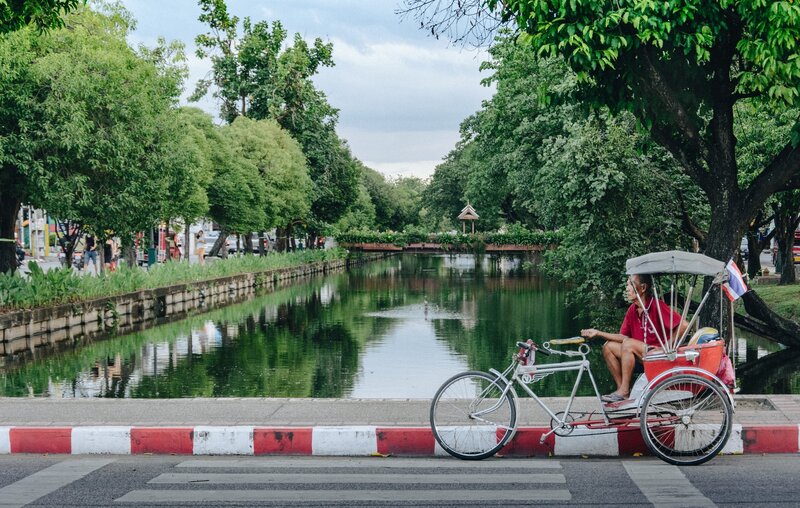
Work in Chiang Mai
Chiang Mai is beyond doubt a treasure for digital nomads: fast internet, plenty of online work-friendly coffee shops, huge coworking spaces in a multitude of locations. Over the years it has grown a big expat community and now it is absolutely convenient in navigation, looking for information, or networking if needed.
Best Places to Work in Chiang Mai
The city has several favorite spots for online working and, of course, the top is coworking spaces with their availability and high-quality service:
Punspace
Punspace is one of the most popular among digital nomads. For your taste, you can choose one of the two spots it has: Punspace Tha Phae Gate or Punspace Wiang Kaew, both located in the historical center of the city. The outstanding design, great location, private atmosphere, free never-ending coffee – everything you can expect from a good coworking space; moreover, there is high-speed internet, very quiet arrangements, 24 hours in service from Monday till Friday, chill areas, and one-on-one offices apart from shared rooms. Punspace offers one day pass or monthly membership from about 4,000 Baht (USD 130).
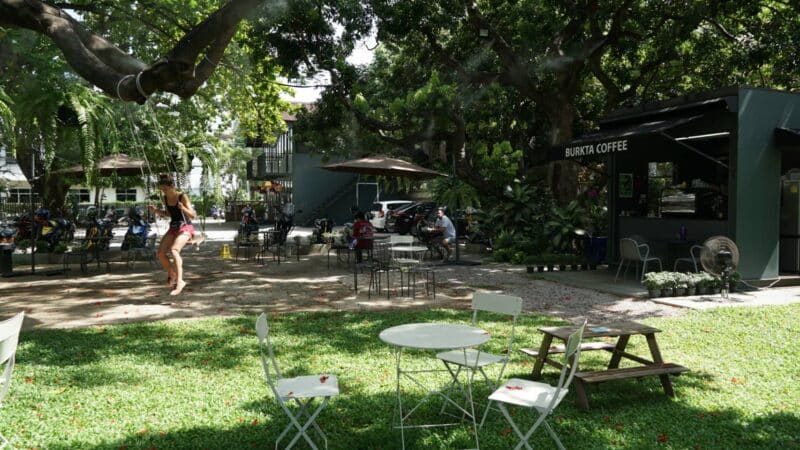
CAMP
Another popular coworking space that has occupied the expanse of the top floor in the Maya mall. The visitors of the place are mostly Thai students and some foreign freelancers. The entrance is free but after the first hour, the internet is accessible only for the order over 50 Baht (USD 1,60). It must be a great place for students, but depending on the work you do it could disturb with insufficient Mbits. Also, no talking aloud is allowed and it is strongly recommended to use headphones in support of privacy mode. The positive sides are the value and availability 24/7.
Alt_ChiangMai
Located on Intrawarorot Road, Alt_ChiangMai is a well equipped coliving & coworking space. Offering several different packages from hot and cold desks to private offices, prices range from 2,790 THB / month for a hot desk to 13,000 THB / month for the most exclusive private office. You will also find conference rooms, phone booths, a quiet zone and chill spaces.
Alt_ChiangMai also has a thriving community so it is a great place to connect and collaborate. There are many events going on during the week so you can get to know the people you work with.
Wake Up
Actually, not essentially a coworking space but a coffee shop with speedy internet and great spacious facilities for online workers. It is open 24 hours and offers great coffee brewed from the best coffee beans in the world. Better to come earlier if you consider spending most of the day working because the best spots for work are upstairs while on the first floor it functions more as a restaurant with delicious food. Price is a purchase from 50 Baht (USD 1.60USD 127) which prolongs the internet accessibility.
Cafes
Living on a budget is not difficult in Chiang Mai but might mean that spending money on coworking spaces is a run out of credit. Being productive at home is helpful though if you need to stretch and change a location once in a while, some coffee shops will definitely fit this purpose. First of all, it is not extraordinary to see people completely sunk in the screens of their laptops everywhere – Chiang Mai is full of digital nomads! So, take into account some cafes and coffee shops with decent internet like Analog Cafe, Artisan Wua Lai, The Barn, Bob’s Coffee, Heartwork, etc. All of these places are extremely cozy and friendly to digital nomads: flying WIFI, socket supply, level of quietness, and conscience staff and guests who enjoy their time without bothering others.
There are heaps of places to work remotely in Chiang Mai and the internet is running fast from 2 Mbits in local public spots like cafes and coworking spaces, even some gyms. The inexpensiveness and excellence of the service definitely make Chiang Mai one of the best cities for digital nomads.
Best Places to Live in Chiang Mai
Best Neighbourhoods
Chiang Mai – the northern largest hub of Thailand, one of the greatest destinations of the Land of Smiles, and definitely a box to tick on every traveler’s bucket list – in fact, is quite a town with a small rich in history center and many sub-districts around it. Chiang Mai covers the territory of approximately 8,000 square meters and its population is only 1.8 million people, excluding expats and unregistered foreigners from nearby countries.
There are several neighborhoods to consider as a foreigner to remain for a few days or as it often happens in Thailand for a few years.
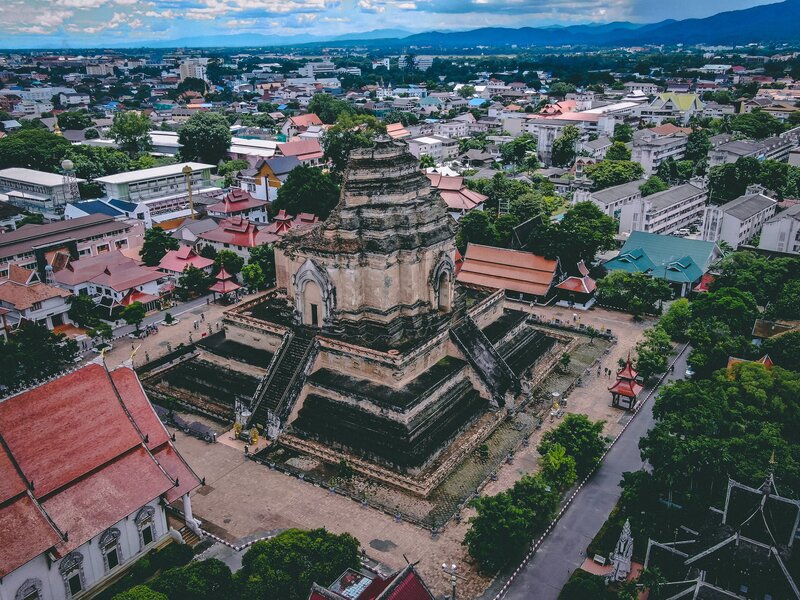
Old City
If your intention is to come for a short visit, you might find the city center – Old city – the most suitable starting point for all your adventures in Chiang Mai. There are plenty of comfortable, bed-n-breakfast hotels, Airbnb’s accommodation, hostels, and boutiques in the heart of the city. The good side is that you don’t need to go anywhere, everything you need is just in front of you! The flip side is that it is worth getting outside from the Old City walls to see what else the northern capital and its vicinity have to offer.
Nimmanhaemin
The second-best neighborhood according to the expats’ rating is The Nimmanhaemin neighborhood. It is an absolute digital nomad’s top place, as it has all the upsides: trendy shopping malls, cozy coffee shops with fast internet, delicious restaurants, tons of bars, and clubs to go out to. It is located in the northwest of the Old city down the Huay Kaew Road. Here are the good apartments to rent for the long term as short-term hotels and homestays. This neighborhood is very popular among just arrived digital nomads and certainly, you will not feel lonely in the like-minded crowd. The Maya Mall is the best reference point for someone who wishes to stay in this area. You can easily find some suitable apartments or rooms nearby.
Ban Sathaphon
Also, surfing the Facebook pages you can bump into some good offers in the Ban Sathaphon neighborhood which is just 10 minutes drive from the Maya mall in the Nimmanhaemin neighborhood. Being slightly further from the epicenter of the nightlife helps Ban Sathaphon to keep its quiet but really nice vibe.
For absolute tranquility, there are always some more outlying condominiums on Mae Khua Mung Road in the northwest of the city, almost beyond its border.
Overall, Chiang Mai cannot be called a giant megapolis with complex infrastructure and obscure neighborhoods. It is rather a cozy town with its lively narrow streets, bulky public transports, and beautiful northern Thai architecture.
How to find an Apartment
Finding an apartment as a foreigner in an unknown city might be somewhat stressful but really in the Land of Smiles, it is nothing of the sort. First of all, the reason is that Thailand skillfully adapts to the needs of tourists because a great deal of the national income is sourced from tourism. That’s why, in Thailand, the most popular cities and islands (like Phuket, Pattaya, Chiang Mai, Koh Samui, etc.) are sinking in miscellaneous offers for crowds of foreigners, who are eager to stay for a long term. Secondly, Thailand is generally a very welcoming host – people are warm and happy to be at your service.
So, how to start looking for an apartment in Chiang Mai?
My advice is to start by looking in the trendy neighborhoods like the Old City and the Nimmanhaemin neighborhood, where you can definitely find something from basic and cheap to all-inclusive and costly. It is not hard as the Old City and the Nimmanhaemin areas are usually packed with everything for tourist necessity. Many newcomers normally start from short-term accommodations like hostels and hotels and then grade to a condo of their dreams. Depending on the season: low – is from April till October, and high – from November till March, it is even possible to arrive in Chiang Mai without booking in advance.
Once you are settled in the local hotel or hostel it will be easier to look for long-term rent. In my own experience, Facebook groups and the marketplace work best. Thai people habitually post pictures of their condos and offer prices for one-year contracts. Of course, sometimes one year can be too much, but it is always possible to negotiate with owners. There are some rental groups on Facebook to join like: Real Estate Chiang Mai, Farang Chiang Mai Real Estate, Rent & Sell House in Chiang Mai, etc.
Other resources which you are probably aware of are Booking.com and Airbnb.com, which also have some relevant offers of long-term rent in this beautiful city. Though it might be that you will need to pay some extra to the website and the prices might be higher, however, for some individuals, it gives a sense of security. Personally, I prefer to risk and always contact people on social networks or even better just walk in the street of the liked area and check the rent signs. For me, it seems nicer to have a face-to-face experience with the locals and there is still good old adventurism.
Chiang Mai is a great match of quality and price, so if you are on a budget you still can afford more than a nice place and live like a king. For instance, you can get a decent comfortable studio for a minimum of 4,000 THB (USD 127) per month, and a really nice apartment of one bedroom and one bathroom with a pool on the adjacent territory for a minimum of 10,000 THB (USD 320) per month.
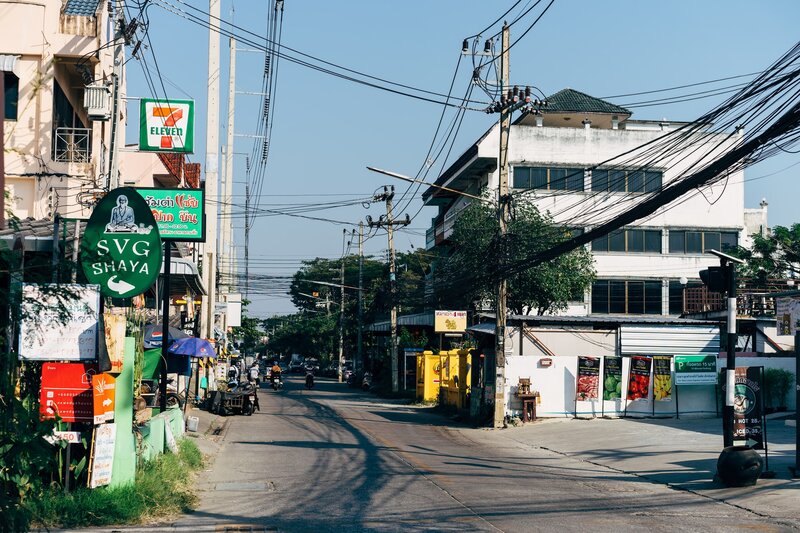
Cheap Places to Stay in Chiang Mai
Chiang Mai is a paradise for any traveler on a budget – it can be incredibly cheap and at the same time beyond any expectations!
At first, arriving in Chiang Mai I didn’t know about the abundance of wonderful places to stay, so I just booked the cheapest hostel which was trending on Booking.com. Usually, this website offers a place with great bargains for the nearest time. In 2018 paying only about 125 THB (USD 4) per night made me happy with the place I got, now I would definitely invest some time to look up hotels with pools and rooftop bars because they also have getaway deals. So, the price for a room in the nicest hostel fully equipped with extra benefits can start from 410 THB (USD 13) per night. Keep your eye on the renewable list of hotels and hostels on Booking.com, Agoda.com, Tripadvisor.com, Trivago.com, etc., and many affordable places and interesting deals will pop up.
Here are some of my picks of different reasonable categories:
- “The Moat Hostel” is right inside the Old City, located close to the eastern part of it. The hostel is quite cheap and convenient for nights out because of its location. A night costs approximately 130 THB (USD 4.20).
- “Monkey toe Guesthouse”. The guesthouse is casual and cheap with a good lounge zone and super close to the North Gate of the Old City. The prices start from 205 THB (USD 6.60) per night.
- “The Tanwa Hotel” is a 3-star hotel which is not close to the historical center but has great service and it is rich with a dense greenery vibe. The cost starts from approximately 494 THB (USD 16) per night.
- “ The Phor Liang Meun Terracotta Arts Hotel” is a 4-star hotel with a beautiful interior, a swimming pool, and a Thai spirit of aesthetics! Though it is the most expensive from the list, the price of one night is standard for most western countries – 1,235 THB (USD 40). And fortunately, there are some getaway deals!
Thailand Visa for Chiang Mai
Nowadays when the pandemic has messed things up the info flow is unstoppably refreshing the news of the visa regulations in different countries almost every week and Thailand is not an exception! Luckily, Thailand has always been loyal to tourists, and for most western countries at the border cross, a visa wasn’t required. So, depending on where you are from, I would recommend checking the information on the official resources of the Thai government in your country. However, as far as it is spread across the network Thai government decided to open for tourists in the first months of 2021 with the quarantine measures upon arrival which tremendously leads to light at the end of the tunnel! You still can travel without a visa and stay for 30 days if you are willing to quarantine for 10 days and I think it is a great step forward for the growth of tourism in the country. Whilst already in the country there is a possibility to apply for an extra 60-, 90-days in the Thai embassy.
Despite the fact that the pandemic is closing “doors” in many countries now visa-run is still available for non-immigrant visa holders, so if you desire to prolong your visit to Thailand you can go to Laos as the most popular point for a one-two days trip. Keep in mind that working on a tourist visa is illegal and it is not eventually that hard to obtain a work visa if you have necessary papers from your employer, although some employers are not interested in dealing with it.
Culture and Food in Chiang Mai
You can love the culture but without food, it is tasteless…
What an enormous joy and mouth-watering anticipation sweep over like a wave when you walk through the busy, spicy night market with its Pad Thai (fried noodles), Tom Yum (shrimp soup), Som Tum (papaya salad), and Khao Pad (fried rice)!
I fully believe that the first insight into the culture starts from the first bite of the local delicacy. Wherever you are in Thailand you find colorful night markets gathering the crowds of Thais and tourists like a magnet.
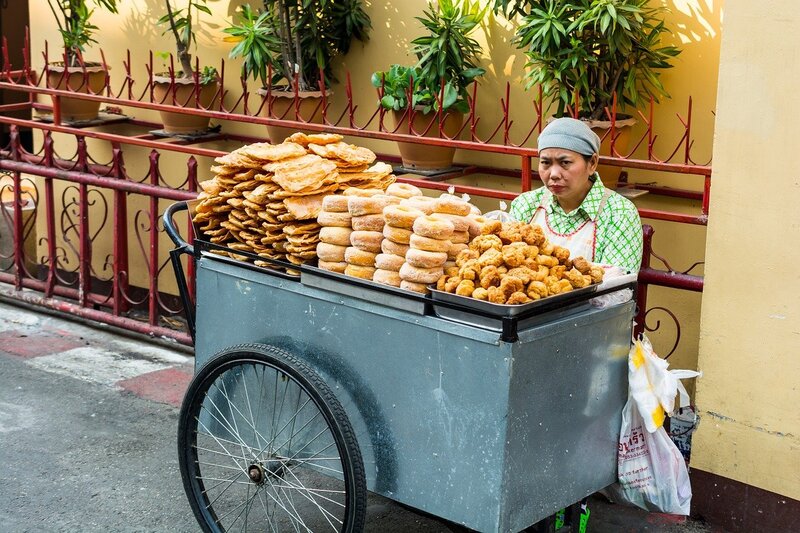
So, what is so special about Thai food, that it makes local businessmen set up cooking schools in the center of Bangkok because of the high demand among enamored tourists?
First of all, it is the abundance of ingredients and their variations: Thai fried rice with all those sides and herbs! Mmm … Lots of seafood at affordable prices enrich these dishes too; fruits and vegetables which grow all year round, thanks to the tropical climate. Second of all is the frenetic spices: there are 4 extra toppings on each table of Thailand and they are oyster sauce, sugar, minced chili pepper, and some garlic sauce or other mixes. What a culture shock it was when I saw some of my Thai friends pouring it all together to their soups and main dish! I must admit after trying it once I loved it but without adding sugar.
Without a doubt, cuisine plays a big role in Thai culture – food is not just a source of nutrition and a need but life itself. People eat out a lot – restaurants are not a luxury, it is a daily habit. Depending on the pocket, it can be something simpler as a canteen, or a street food open-air eatery or a nice fancy restaurant, but generally, the food is the same delicious and in an upmarket place, and in a budget one (sometimes even better!).
In order to get fully immersed in the traditions of Thailand, the best is to come during the Thai New Year celebration, Songkran, where you can see the arrangements for this special occasion and fully experience it. The famous waterplay on Songkran is not just a fun game but a blessing that people wish each other for in the upcoming year.
Thailand is home to a respectful and disciplined nation and it is rooted in the monarchical government system and hierarchical social base. People are addressed differently depending on their age, status, or profit. It is probably one of the prominent traits that pop out when observing locals: bowing and adding “-ka” and “-krap” at the end of the sentence is a norm of everyone’s etiquette rather than a show of excessive reverence.
Not in vain, Thailand was nicknamed “the Land of Smiles”, people do smile a lot and seem as always in a happy state of mind. Maybe, it is the impact of the wisdom that they love to share with foreigners which sounds like “Sabai Sabai” or in other words “everything’s chill” or “relaxed”. It makes me think “Why are we really so stressed? Isn’t it better to take lessons from Thais and just slow down our galloping lives?”
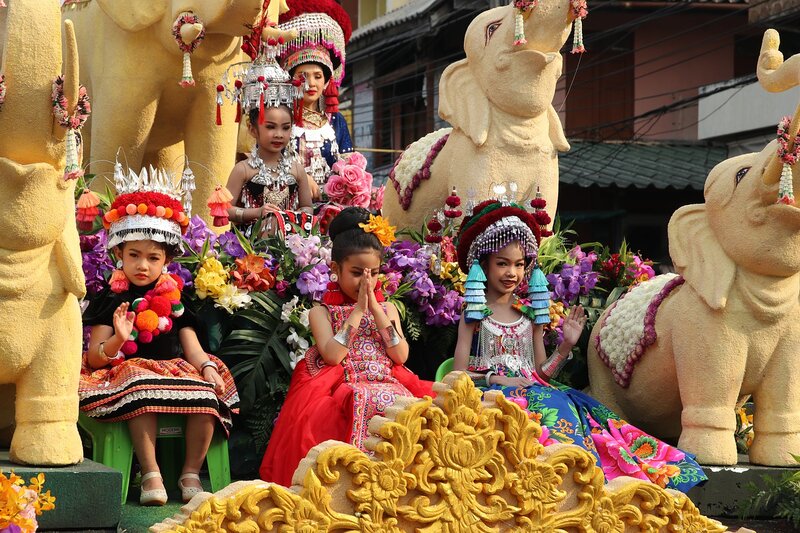
Chiang Mai Nightlife
For me, Chiang Mai’s nightlife was concentrated along and inside the walls of the old city. The perfect square shape of it is fenced by a tall ancient wall with five gates beautifully named with some significance of the historical past, but also called by their cardinal points. Bars, restaurants, street food trucks, and tents – all can be found here in the squared heart of Chiang Mai. For the same reason, a good amount of hotels and hostels are also located nearby bringing a lot of tourists to one of the main attractions of the night city.
However, in Chiang Mai there are plenty of other spots where you definitely can enjoy the night out, partying, or just relaxing and sipping your drink.
The Center (Old City)
My best-loved place is the North Gate Jazz Co-Op bar located just next to the North Gate of the old city in front of its moan. The venue is famous for its classy jazz and blues music nights and it is always full of people. Though, the bar is easy to find because of the crowd standing outside in the street, listening to the alluring loud tunes. Live jazz and blues are especially loved entertainment in Chiang Mai. Walking in the streets at night you will every now and then bump into live music bands singing favorite oldies.
The Nimman Road
For a good deal of parties, the best choice is visiting the Nimman Road area – lots of restaurants for any budget from cheap to chic, clubs with loud music and modish bars with a high concentration of backpackers. The great bar crawl is guaranteed along the Nimman Road in such places as Infinity Club, Beer Lab, The East Bar, and others.
The Ping River
Another spot, which is considered more laid-back and favorite for chilling among locals and expats, is the Ping riverside. The beautiful sunset reflecting in the water, cooling air, and twinkling lights of the terraces everywhere give the atmosphere you certainly enjoy. A riverside vibe is a great option after a long hot day. The places to check out are Deck 1, The Riverside Bar & Restaurant, and The Good View.
In my point of view, the nightlife of the city doesn’t differ a lot from any other Thai city’s: the street with good looking ladies and ladyboys waiting for their clients, friendly bars without windows opened widely to any walking by, busy roads crowded with tuk-tuks (motorbike cabs) and farangs (foreigners) of all ages drinking and smoking everywhere. Freedom is in the air of the streets of Chiang Mai and it is always charming, especially for someone who has just recently arrived in the Land of Smiles.
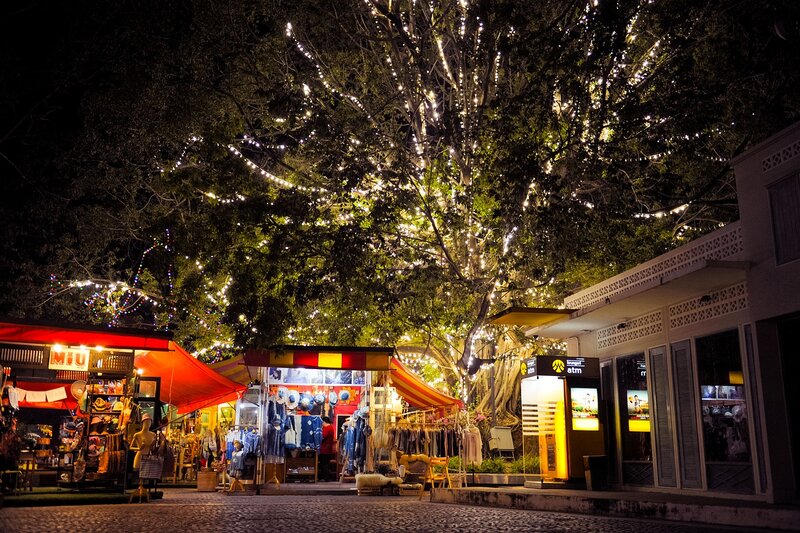
Things to do in Chiang Mai
Many digital nomads remain in Chiang Mai because of its undeniable benefits for online workers and low prices compared to many other places. Though the reason why the city is a gem lies beyond the comfort of a workspace or a glossy coffee shop. The reality is that you can occupy your free time with endless various activities and it is awesome! There are plenty of places to visit in Chiang Mai and outside the city to boost your weekend with fun and new experiences.
People say that Chiang Mai is magical and opens up to newcomers only when they are ready to embrace it. Chiang Mai is famous for its spiritual and cultural life and if you are fond of amazingly beautiful Buddhist temples, ancient gardens, and mysteries of the past you are at the right spot.
Wat Phra That Doi Suthep
To begin with, temples and monasteries are called “Wat” in Thai language and I would absolutely recommend visiting one of the oldest temples in the region of Chiang Mai – Wat Phra That Doi Suthep. This temple is shining with gold from the peak of the Doi Suthep mountain. The view from the top is stunning as well as the temple itself worth visiting. The whole trip to the place can take a day which makes it a perfect getaway from the city on a day off. There are approximately 15 kilometers between the temple and the Old City and a songthaew (a red two-benches bus) can help you to get to the starting point. There are also 200 steps up to overcome, as Wat Phra That Doi Suthep is on the top of a 1,060-meter hill. So, it is quite a hike to get there!
The Bua Thong Waterfalls
If you are an inborn adventurer and nature is your element there are lots of dense jungle and waterfalls for you. In fact, Chiang Mai is ringed with greenery! Don’t miss a chance and join some Facebook groups where expats gather to explore it together. One of the most amazing places to see is The Bua Thong Waterfalls, commonly known as “Sticky Waterfalls”. More than to see it is better to experience extraordinary waterfall climbing whereas the surface doesn’t really stick to you, but the spongy structure of the bottom makes it very easy to climb!
The Old City
Living in the city center is already an immersion into the Thai culture: The Old City is packed with historical buildings! The spirit of antiquity is dwelling in its streets making it a living museum. There are several temples that are adding some uniqueness to the center like Wat Chedi Luang, Wat Phra Singh, and Wat Phan Tao.
Wiang Kum Kam
Chiang Mai is an exceptionally old city, whose foundation is dated in 1296 when it became the capital of the bygone Independent Lanna Kingdom. To satisfy the curiosity of Thai history it is a must to visit the older capital of this dominion – Wiang Kum Kam. The city is an open-space museum now and after the restoration, it became one of the top getaways, located just about 5 kilometers from the Old City to the southeast. There are many exhibits of the Lanna culture from the 13 century: architecture itself, Buddhist sculptures, and items of everyday life.
Elephant Sanctuary
For some people to see a live elephant close in its habitats is a dream and really it can easily come true in northern Thailand. Uncommonly or not, I never had it on my wish list, but unexpectedly I got to see a giant animal in one of the northern National Parks! The elephant decided to cross the road and all cars froze at this moment like in trance – it was an unforgettable experience! However, it is also very dangerous, because in wild nature animals are unpredictable and a distance can be life-saving. If your dream is to see elephants close and safe, the best is to find authorized elephant sanctuaries, thanks to popularly they are growing in number! Though be careful and choose wisely, not all sanctuaries take care of these animals and poor them can suffer mistreatment and cruelty. Here are some sanctuaries that are cruelty-free and provide you a responsible experience: Kindred Spirit Elephant Sanctuary and Elephant Nature Park.
Things to do in the city
Apart from all the cool places you can find outside of Chiang Mai, there are actually plenty of leisure activities in the city and there is no need for a whole day to explore them if you are really busy working on your projects online.
First of all, night markets are places that cannot be avoided in Thailand. I recommend trying all kinds of street foods in Chiang Mai and furthermore, it has unique northern dishes you wouldn’t try anywhere else, like Khao Soi (chicken noodles) and Sai Oua (a fried sausage).
Secondly, don’t even think of leaving Thailand without getting Thai massage! Real Thai massage that is so replicated all over the world is possible to get here any time you want! As an option after a hard day of sitting in front of the laptop in a local coffee shop, your relaxation can cost only 5-7 USD. I know many indeed expensive masseuses who travel to Chiang Mai on purpose to master their skills and get certificates from respectable old teachers of Thai Massage. Even I had a desire to accomplish a course of Classic Thai massage for just 16,000THB (510 USD) but instead, I went to Bali.
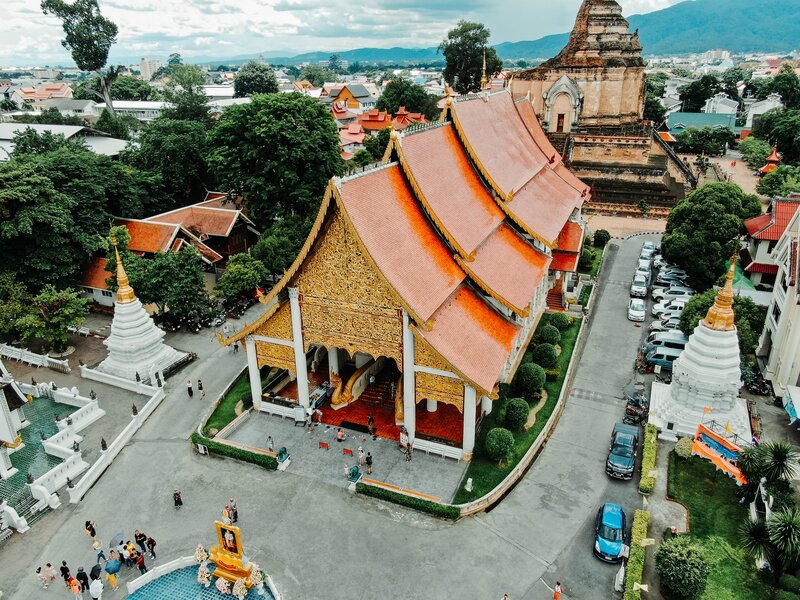
The nightlife of Chiang Mai is also a very vivid attraction and there are heaps of bars, restaurants, and clubs to go to. You meet all sorts of people from all over the world here by the Northern Gate of the Old City or do a bar crawl in the Nimman Road area. At least once it is worth doing even if you are not a party animal.
Overall, the time spent in Chiang Mai is priceless and I strongly suggest taking advantage to the maximum. The elephant sanctuaries, bar crawling in the Nimman Road area, jungle hiking, getting authentic Thai massage a few weeks in a row, delicious Thai cuisine, ancient temples, and abnormal waterfalls – isn’t it all worth repeating?
Best Time to Visit Chiang Mai
There are many things to love about Chiang Mai and its weather is definitely in the list.
When you look at the map, you see mountain chains enclosing very neatly to the city. And though the elevation is not sky-high the mountains still bring the city coolness, unlike the capital plain has got.
Chiang Mai is situated in a tropical climate zone which means it hasn’t got European summer, spring, and winter, rather it has a “rainy season and hot season” like a typical tropical jungle.
The rainy season begins in early June and lasts till late October. The temperature during this time is averagely 30C (86F) degrees and it might sound a lot for some people, but the truth is that through overcast and frequent rains with smooth chill breezes it feels much lower.
The heat comes to the city in the mid of March and stays then till May. No wonder that the popular holiday Songkran is being celebrated right on the most burning days of the hot season! It is really helpful to have a stranger behind the corner with a bucket of iced water which is thrown into your face every 5 minutes!
The temperature during this period can reach 40C (104F) degrees. Honestly, after celebrating the Songkran festival in different cities of Thailand – Phuket, Bangkok, and Chiang Mai – I find the heatwave the most bearable in Chiang Mai. Yes, it was hot and the bright sun was relentless but it is nothing compared to scorching heat in the south.
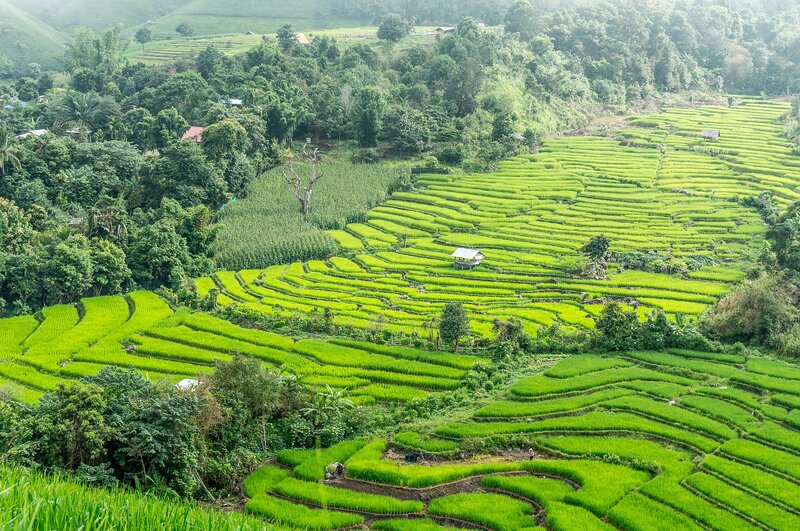
Chiang Mai for Families
Chiang Mai is clearly not a big city and its population is just approximately 127,000 residents. But what if I tell you that the number of expats equals almost 40,000 by some latest research? Isn’t it incredible that the city’s growth is so significant owing to the flow of unbound incomers?
No wonder that people often start their families in the Land of Smiles and decide to settle down or just come with their family and stay long-term. In the end, why not live in such a beautiful city?
By the opinion of many expat parents, the city surely withstands the test on living with children. Thai people are very friendly and they respect personal space – you won’t meet awkward keen interest in your offsprings in a public place like it might be in some other Asian countries. And of course, there are lots of activities to do with children in your spare time! The places you can take them to are Chiang Mai Night Safari, The Elephant Sanctuary, Cooking classes, Child yoga, Grand Canyon Water park Chiang Mai, Chiang Mai Zoo, excursions to nearby waterfalls, indoor play areas in all major shopping malls such as Central Festival, Maya and Kad Suan Gaew, etc.
Another question that sooner or later pops up in parenting life is “What schools should I give my child to?” and fortunately, there is a good choice in Chiang Mai. Here some international schools and childcare to look up: Satit International Bilingual School of Rangsit University Chiangmai, Prem Tinsulanonda International School, Chiang Mai International School (CMIS), and so on.
For younger kids’ parents, it should be mentioned how easy it is to find a private babysitter for a reasonable price.
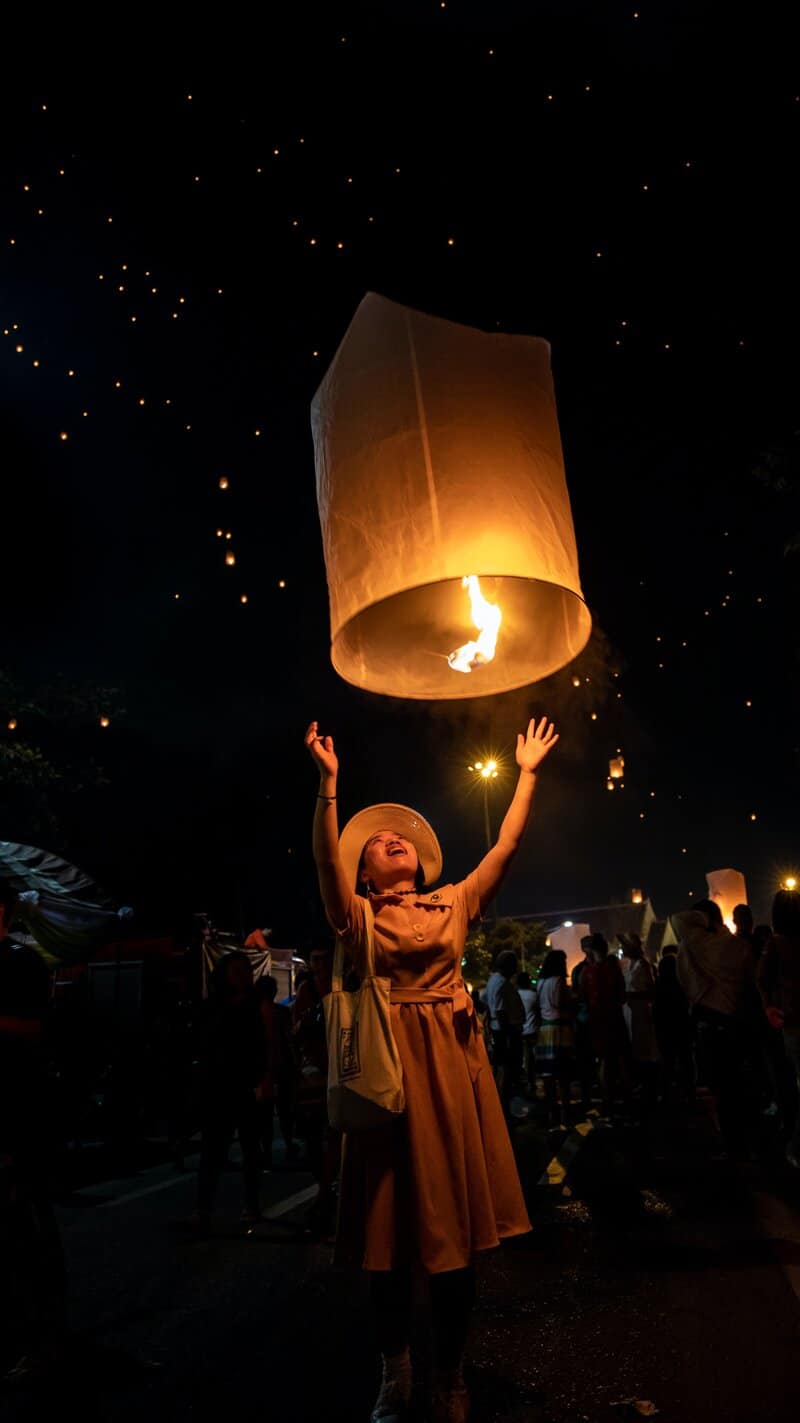
Living in Chiang Mai
Chiang Mai Transportation
The first time it might seem tricky to get around in Chiang Mai because of the absence of a distinct transportation system.
Coming from the capital to the second-largest city in the country I did not research any information about the way to use public transport there. As a result, it took me one hour at the main entrance of the railway station to comprehend that songthaew (or “red car” in Thai language) is not just a public transport in this city but actually, a real taxi that can be hired and shared with other just arrived visitors. My misunderstanding was rooted in a well-organized public transportation system in Bangkok, where you can get anywhere by MRT (metro), BTS (an elevated rapid transit system), big buses, songthaews of different colors which also have their own unchangeable routes, and tuk-tuks (small two passenger cars).
So, what transport do they have in Chiang Mai?
First and foremost, of course, it is songthaew – a pick-up truck with an open backside with two benches inside. There are six colors that help to figure out where the car is operating. Most tourists encounter red ones which function in the city center, nearby the walls of the old city. Others – blue, white, yellow, green, and orange – hold their route from Chiang Mai to surrounding towns, provinces, or even national parks. Beyond doubts, the fare is very cheap if you are going with many other passengers, but the time of a trip can increase incredibly. The reason is that the driver’s income depends on the number of people, so the course can deviate multiple times to drop passengers on the way.
Tuk-tuk is another transport and very popular one, especially if to haunt in the city center. The tuk-tuk drivers usually call out their clients, so it won’t be a problem to get a ride. Prices depend on the distance but you can always bargain down.
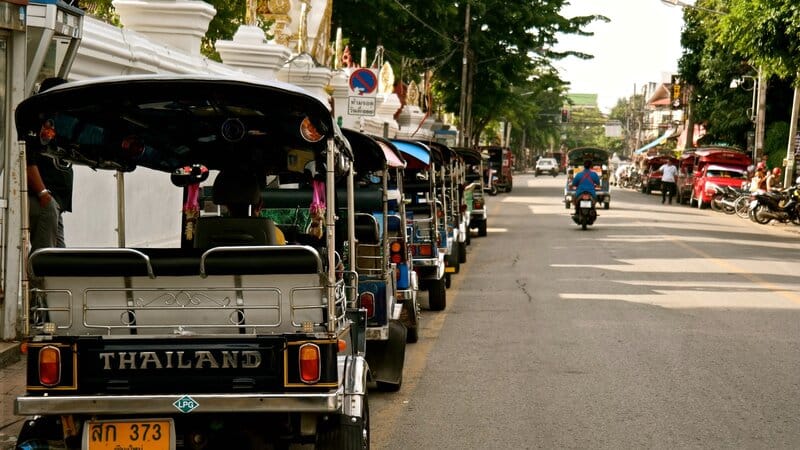
Taxis – a convenient but a higher cost option, though the best one to secure your schedule if you need to get to the airport, for example. There are several ways to hire a taxi: the first one is to flag it down along the roadside, the second – to download applications like Uber or Grab. In case of catching the taxi along the road, it is recommended to insist on the meter. Some dishonest folk can try to take advantage of naive and inexperienced tourists.
The last transport most common in use among expats and locals is a rented scooter or motorbike. Also, if you want to drive only a car, it is possible to rent as well, however, practice shows that it is quite expensive in the long term. At the same time, motorbikes rental shops are plenty in Thailand. This popularity brought the possibility to rent them at a very low price. However, there are some things to be aware of while renting a vehicle. Make sure your license and insurance are relevant and don’t leave your passport to the renter, then it might be a scam. Highly recommended to take pictures of the vehicle: any scratches, dimples can become a problem afterward if there is no evidence of their earlier existence.
Fitness and Health
Luckily, I had a small gym and a swimming pool in my condo and it is quite common in Thailand to have an inclusive gym with at least 2 treadmills and some exercise machines and weights. Also, I went running almost every night to the nearest park which belonged to the university nearby.
Though, living in a Chiang Mai dreamland with dining-outs, cheap night markets, and parties till the dawn is marvelous, it might have a bit of a challenge for keeping the best shape. Fortunately, there are plenty of places to work out! It is worth mentioning that we are all different and have different preferences, so I will try to cover all the city options.
Chiang Mai is outstanding with its beautiful tropical parks and if you are like me enjoy jogging you definitely need to visit green spaces like Buak Hard Public Park, Chiang Mai University Running Track, The Old City Moat. First I jogged at noon and was surprised that there were no people at all…well it is wiser to come after 6 p.m. if you don’t want to get a sunstroke.
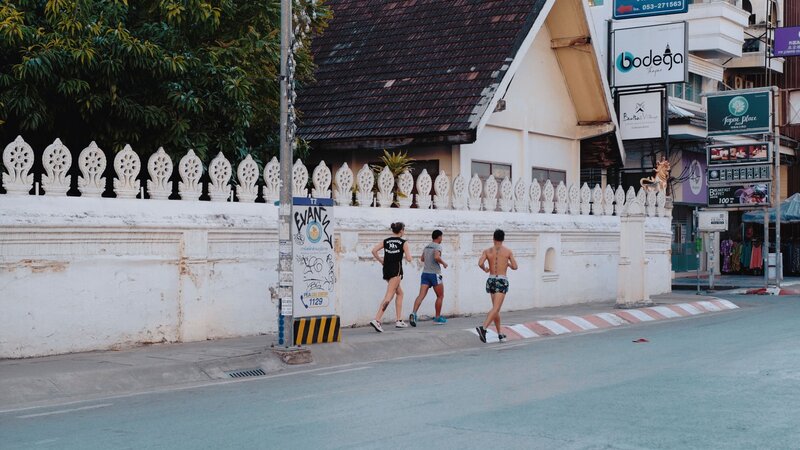
If you desperately need some air conditioning while exercising, I fully relate. Here are some gyms that are great in service and size: Powerhouse Gym Fitness Center and Maxx Fitness.
For everyone who is a yoga fan, Chiang Mai is a hotspot of all shapes and sizes of existing yogas. You can visit popular studios: Yoga Ananda, The Bodhi Tree House, etc., but also, there are some free and on-donation yogas in the city center.
Chiang Mai People
Though the language barrier split us apart in some way, I was lucky enough to make several outstanding Thai friends in the Land of Smiles. Among them were people of different professions like video-makers, models, students, musicians, and restaurant owners, but one thing that united them all was a good fluency in the English language.
Thai people are not just welcoming hosts who let you enjoy their cherishing country but also loyal and gentle friends. Beyond any doubt, I would not prevaricate if I say that Thais are the most tolerant nation I have ever met on the planet and the proof is the huge expat community that grew in virtue of flexible immigration policies. During my adventurous life in Thailand, I met many people from Africa, Europe, and the Americas who had lived for ages in the country on successive non-immigrant visas. Doesn’t it tell us about Thai tolerance foremost? Of course, as well as the famous nickname of the country “The Land of Smiles”. You might be surprised to know that there are 13 ways of smiling each with its special meaning and use in a certain situation!
Although it might not be so obvious for a temporal visitor, the northern Thai population is very different from the central. After a year spent in Bangkok, the lifestyle in Chiang Mai seemed too rural and people – relaxed and more simple. The thing is that Bangkok is infested with business people rushing every hour somewhere, like any regular megapolis with over a 10 million population! Meanwhile, Chiang Mai resembles a village with its 127 thousand residents – a beautiful playground where everyone knew each other and for many expats it is indeed more appealing.
Also, religion plays a major role in Thai personality. Buddhism is spread in all regions of Thailand and Chiang Mai is an epicenter of spirituality and faith of the Thai population. People honor their traditions and many Thais come to Chiang Mai’s vicinity to forsake the world and serve some time in a monastery. Thai people believe that sinning leads to a hell world and doing good is improving your “karma” and eventually brings you a better life after rebirth. Imperceptibly karma becomes a pattern of life and in some way, it might control your response to others. This philosophy has grown in a great popularity among foreigners and it doesn’t surprise whilst seeing the kindness and friendliness of Thai people.
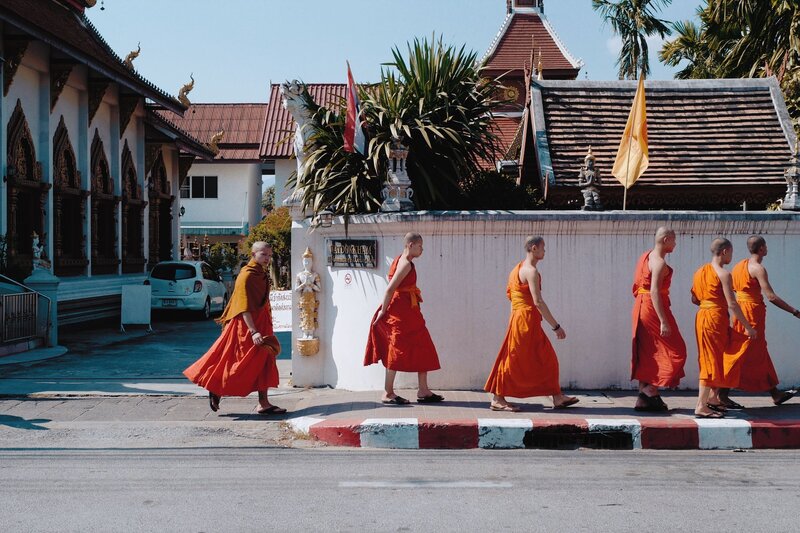
Chiang Mai Insurance and Medical Care
At some point in my expat life in Thailand, I really regretted not getting health insurance beforehand. Tropical climate, high humidity, air conditions, new bacterias are just some of the factors that didn’t come to mind when I was booking a flight with the intention of a long-term stay. My immune system though is far from impregnable and as a result, once I had to visit a public hospital and I was blessed to receive healthcare in a line with other Thai residents. I was lucky enough to have my kind English-speaking Thai friend by my side. However, without her help, I wouldn’t have been able to manage that complicated mission.
In contrast to that, purchasing international health insurance gives the privilege of private healthcare with highly professional doctors and English-speaking service, which is very appreciated in extreme situations.
According to the official resources Thailand has also been on the green list of the Covid-19 least infected countries. So, doesn’t it already say a lot about the medical care service in the country?
In many places, due to the pandemic, medical insurance became a must for foreign visitors and Thailand is no exception. Here are the most recognizable companies to take into account, in case you are planning to travel: Pacific Cross, AXA, Bupa, NZI, Thai Vivat. Overall, Thai medicine is very competitive and never the less than western health services.
Make sure you are fully covered by reading our full Digital Nomad Travel Insurance guide.
Jobs in Chiang Mai
On the Buddhist retreat, I met a few Chiang Mai residents of different professions and different nationalities. Many meditators were digital nomads and worked remotely, which was very convenient considering that renewing temporary visas had become almost an endless opportunity with “visa runs” to neighboring Laos or Vietnam. Also amongst them were psychologists, bloggers, writers, English teachers, journalists, business owners, and just travelers with no purpose.
I worked as an English teacher in a local public primary school- a job which can be promptly found in Asia with appropriate certificates and high education(and with decent fluency in the language, of course). In this way, if you are a native speaker (or even not) you can find a teaching position in Thailand at ease. Only it better be a legal position, so your employers could provide you an appropriate visa to avoid any mess in the future.
Other jobs are also possible to find, however, remember that there is a list of positions in Thailand – so-called “prohibited occupations for foreigners”. It normally includes work in agriculture, wood carving, animal husbandry, forestry, or fishery, bricklaying, carpentry, or other construction works, and so on. In other words, all that can be done unhindered by Thai citizens.
Besides, because Chiang Mai is a touristy place, there are enough shops and bars owned by foreigners as well. Many of them are happy to employ international workers, even though there is a quote for Thai staff established by law. So, it might bring a good opportunity for earnings too.
Check out our Digital Nomads Jobs Postings to find the best jobs available for Digital Nomads.
Cost of Living Chiang Mai
No wonder, Chiang Mai is one of the favorite digital nomads’ spots on the planet – it is affordable, comfortable, and vibing. Chiang Mai has its unique glow quickly notable at the very moment of the arrival. First of all the city is compact: you can almost walk everywhere but better to rent a motorbike. Secondly, eating out is incredibly cheap and delicious and probably you will forget how to cook! Thirdly, you don’t need the fortune to afford a good life!
So, what is the average cost of living in Chiang Mai?
Honestly, I compared everything with Bangkok as it was my temporary home at that point and I loved it, but the calculations were not in its favor: Chiang Mai was definitely cheaper!
The housing in Chiang Mai per month is on average 8,000 -15,000 THB (255-480 USD), varies on the location of the apartment. In Bangkok, the price starts from 12,000 THB (385 USD) as a minimum for a nice apartment in a condo but significantly far from the city center.
The motorbike rental is approximately 2,000 THB (65 USD) per month in both cities. We rented it for 2,500 THB (80 USD) in Bangkok but to my knowledge, it doesn’t differ a lot from Chiang Mai.
The biggest expense here might be food, grocery, and eating out – it is 12,000 THB (385 USD) on average per one person for a month. Seriously, be aware that cooking is hard in Thailand when it is so easy to wine and dine every day!
Travel and entertaining could be done for 5,000 THB (160 USD) per person and it is only in case you do something weekly.
The last but not the least point of the monthly budget I would highlight is visa expenses. It might be that you are on a non-immigration visa and paying for it is a must. So, to plan wisely, every month one must deduct 2,000-3,000 THB (65-95 USD) on visa expenses.
In total, we have 30,000-37,000 THB (950-1,185 USD) per month to indulge and live life to the fullest with what Chiang Mai has to offer.





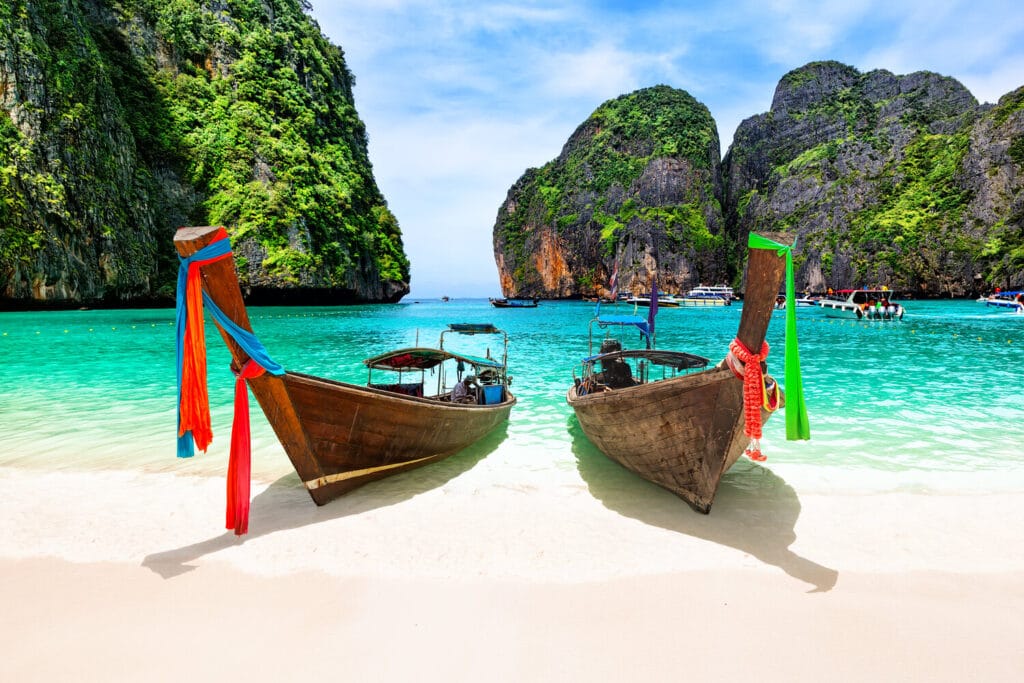
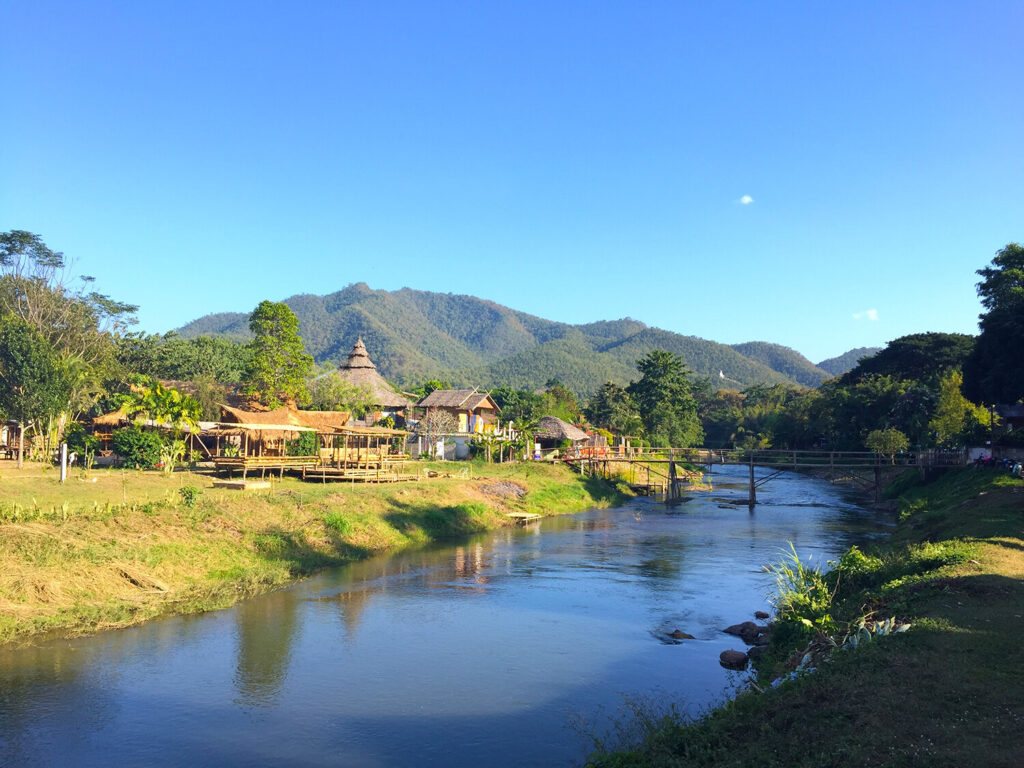

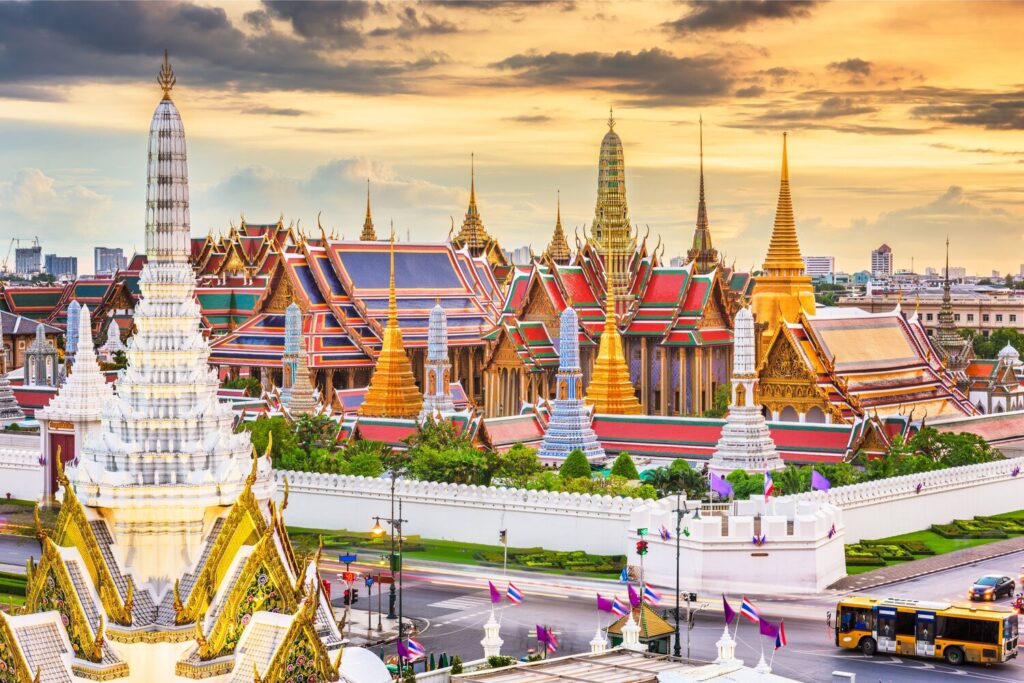



I strongly disagree and urge all nomads to AVOID Chiang Mai at all costs. I also urge nomads to avoid any location in North, Central, East, or North East Thailand.
While these locations are okay during the rain season (June – August), they are a threat to your health during the remaining 8 months of the year due to extreme air pollution from daily trash burning, crop burning, rapid industrialization, and 10+ million diesel-belching trucks and vehicles in this Texas-sized country of nearly 70 million people.
Yes – Thailand is cheap, but I’ve lived her for 10 years and the air is 10x worse than of LA/NYC. My “apartment” has air filtration and I never leave my home without my RZ-brand pollution mask.
This problem spans across ALL of SE Asia – even Bali.
The BEST places to live cheap, with fast WiFi, and with a lot of activities to do in your free time with GOOD air quality include Phuket and… that’s it. However, the “Hamptons” of Thailand (where the rich and royal Thais own beachside property) is only 3 hours south of Bangkok. I think it could be the next Digital Nomad hot spot!! It’s a bike-friendly beach town, many Western restaurants and many cultural and natural attractions. Theirs a red Thai-Chinese themed night market and you’ll find everything from beach, mountains and even waterfalls! The problem is that there aren’t many internet cafe’s… However, the proximity of Hua-Hin (thats the name of this upscale Thai beach town) to Bangkok is perfect and it’s going to be connected to the bullet-trains which will run betweeen China and Singapore.